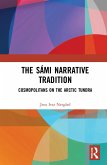"Digital media, GIFs, films, TED Talks, tweets and more, have become an integral part of daily life and, unsurprisingly, indigenous people's strategies for addressing the historical and ongoing effects of colonization. Thomas DuBois and Coppâelie Cocq consider how Sa'mi (formerly called Lapp) people of Norway, Finland and Sweden have become expert at using digital media for personal and communal activism. Grounding their analysis in the 'creative image making' Sa'mi songwriters and poets employed in the 1970s A'ltta' dam protests, the authors examine contemporary efforts, from a singer creating YouTube music videos that combine rock music and joik (a traditional Sa'mi musical genre) to anonymous activist groups sharing images of James Bond in Sa'mi ga'kti (Sa'mi traditional dress) via Facebook. They demonstrate how these artists and activists stitch together indigenous and global symbols to create decolonizing works that invite Sa'mi across Scandinavia into greater engagement with their natal culture while simultaneously convincing a global non-Sa'mi audience of Sa'mi resilience, continuity and inherent right to self-determination"--
Hinweis: Dieser Artikel kann nur an eine deutsche Lieferadresse ausgeliefert werden.
Hinweis: Dieser Artikel kann nur an eine deutsche Lieferadresse ausgeliefert werden.








